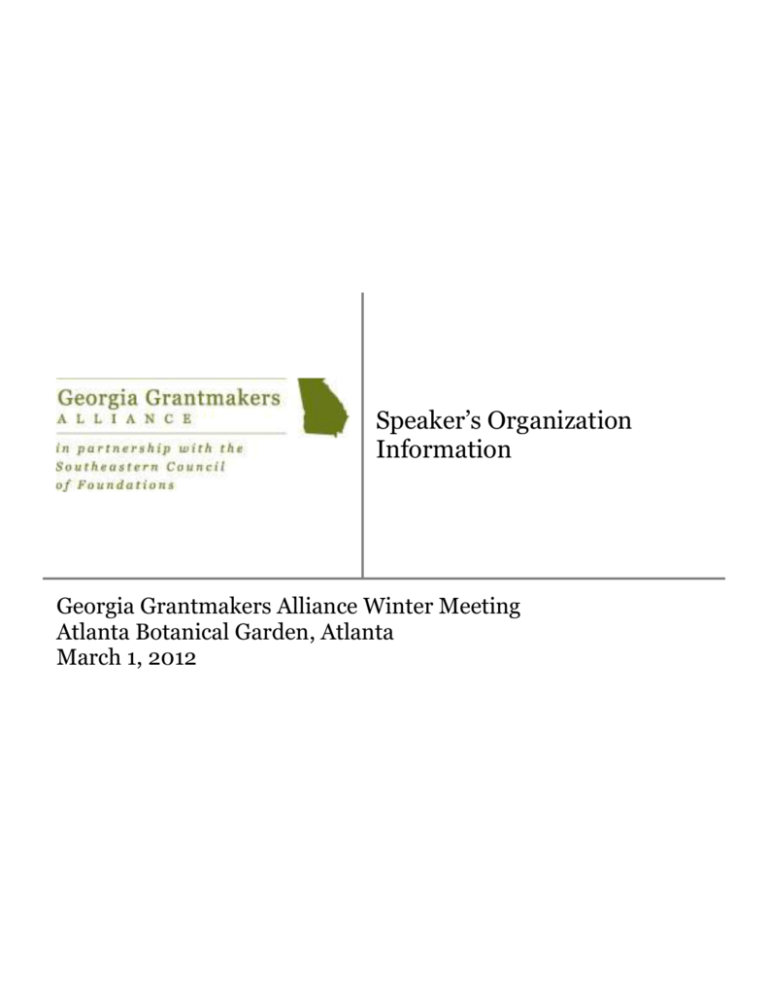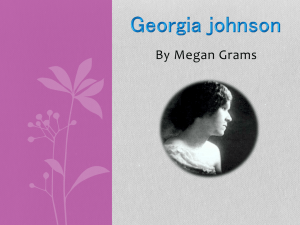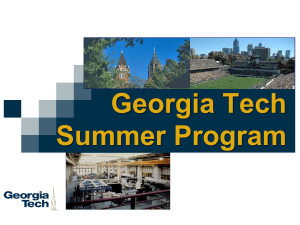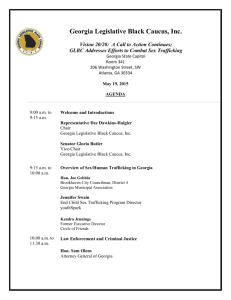Organization Information - Southeastern Council of Foundations
advertisement

Speaker’s Organization Information Georgia Grantmakers Alliance Winter Meeting Atlanta Botanical Garden, Atlanta March 1, 2012 The Sapelo Foundation 1712 Ellis Street Brunswick, GA 31520 912-265-0520 www.sapelofoundation.org Mission Statement The Sapelo Foundation promotes progressive social change affecting in particular, vulnerable populations, rural communities, and the natural environment in the state of Georgia. Core Values: Works to empower people who are powerless or marginalized. Acts as a catalyst in promoting change primarily through affecting public policy. Is strategic and proactive in its funding and leverages financial resources. Convenes potential partners around issues. Encourages collaborative action and networking, particularly among groups with differing racial, cultural, and ethnic backgrounds. Takes risks in grantmaking and encourages other funders to participate. Shares experiences with foundations and other potential partners. Reynolds family members expect to continue to play an active role in the work of the Foundation. Current Programs and Special Initiatives Annemarie and Richard J. Reynolds, Jr. Scholarship Program- Each year the Sapelo Foundation awards approximately $100,000 in college scholarships to students from McIntosh County, GA. 113 students received the scholarship in the 2011-2012 school year. The three projects below were initiated by the Sapelo Foundation and have received funding each year since inception. Georgia Water Coalition - a coalition of 180 groups created in 2003 working to insure sound statewide water management policy for all Georgians JUSTGeorgia - a coalition of 92 organizations created in 2006 working to insure adoption of the most fair and equitable juvenile code possible with a long-term goal of creating a statewide coalition that will advocate, monitor, and report on the conditions, laws, and policies that affect the justice and safety of Georgia's young people. Georgia Budget and Policy Institute – an independent, nonpartisan, nonprofit organization founded in 2004 that strives to raise the level of public policy debate in the state of Georgia. GBPI uses research, analysis and education to advance policies and practices that improve the quality of life for all Georgians. 2 Emory’s Barton Child Law and Policy Center 1301 Clifton Road Atlanta, GA 30322 404-727-0333 www.bartoncenter.net The Barton Child Law and Policy Center is an interdisciplinary child law center founded to protect and promote the legal rights and interests of abused, neglected, and court-involved children. As a clinical program of Emory University School of Law, the Center supports three in-house legal clinics, including two direct representation clinics and a public policy and legislative advocacy clinic. The Center's work is directed by Emory Law faculty and performed by law students and graduate students in public health, social work, and theology. Center faculty and clinic students positively impact the lives of children by providing holistic client representation; conducting research; authoring publications; analyzing and drafting legislation; forming strategic partnerships, and influencing policy directives. Adults Protecting Children, Inc. 5900 Spout Springs Rd., Suite 3C-188 Flowery Branch, GA 30542 770-789-3879 www.adultsprotectingchildren.com Adults Protecting Children is a 501 (c) 3 non-profit organization that trains adults how to prevent, recognize and react responsibly to child sexual abuse. Our focus is in the northeast portion of Georgia. Before we started Adults Protecting Children (APC), we wanted to make sure we were not just duplicating the efforts of other organizations. What we learned was that most agencies were dealing with the TREATMENT end of sexual abuse - suicide, teen pregnancy, alcohol and drug use, etc. There were agencies that wanted to do prevention, but they didn't have the time or resources. Because our focus is primarily on prevention, we felt there was a unique place for us. So in December of 2009 we launched APC. Our 4 Core Values: The adults in a child's life must bear the responsibility to protect that child. Therefore our training is adult focused. There must be a new emphasis placed on prevention, without taking away resources for treatment. This problem will end only when we prevent it. Communities must build a coalition of key leaders, organizations and residents that work to bring about county-wide prevention initiatives. A cultural shift is needed that moves our communities from denial and fear of child sexual abuse, which keeps children vulnerable, to one where the issue is openly discussed and adults are putting in place procedures and policies that will not allow abuse to continue. 3 Georgia Budget and Policy Institute 100 Edgewood Ave, Suite 950 Atlanta, Georgia 30303 404-420-1324 www.gbpi.org The Georgia Budget & Policy Institute is an independent, nonpartisan, nonprofit organization that strives to raise the level of public policy debate in the state of Georgia. Founded in 2004, GBPI uses research, analysis and education to advance policies and practices that improve the quality of life for all Georgians. Each year, GBPI: Provides research and recommendations that are featured in dozens of news articles and editorials. Identifies best practices from other states to suggest alternative solutions to existing problems and fiscal policies facing Georgia. Publishes dozens of fact-based reports on critical issues affecting Georgia’s financial future. Educates legislators regarding tax, budget and policy implications of upcoming legislation. Center for Safe and Healthy Children at Children’s Healthcare of Atlanta MOB, Suite 500 1001 Johnson Ferry Rd, N.E. Atlanta, GA 30342 404-785-3829 www.choa.org The Center for Safe and Healthy Children (CSHC) is a comprehensive child maltreatment program at Children’s Healthcare of Atlanta. Staff members provide clinical services for abused, exploited and neglected children and their families throughout Georgia. The Center administers 3 child maltreatment prevention programs, provides education to medical and nonmedical professionals on child abuse and neglect, and advocates for child welfare at the local and state levels. The Center is recognized as a leader in the state in issues of child maltreatment and has collaborative relationships with multiple state agencies, academic institutions and nonprofit organizations. Clinical Services: Two outpatient clinics serving suspected victims of child sexual and physical abuse or neglect o Videotaped forensic interviews o Comprehensive medical evaluations o Mental health assessments, therapy and referrals o 1300 patient visits in 2010 After Hours and Weekend Sexual Assault coverage of 2 Emergency Departments o Specially trained social workers and nurse practitioners provide evaluations for victims of acute sexual assault/abuse and commercial sexual exploitation in the Scottish Rite and Egleston Emergency Departments (services to begin in Hughes Spalding ED in 2012) o 144 patients seen in 2010 4 Comprehensive medical evaluations of children admitted to 3 Children’s hospitals for suspected physical abuse or severe neglect o 255 patient consultations in 2010 Telemedicine services to patients in rural Georgia o 127 real-time medical exams in 2010 o Also provided: second opinion case/photograph reviews o Telemedicine network is expanding to ~20 sites in 2012 Child Maltreatment Prevention Programs: Period of PURPLE Crying (primary prevention of shaken baby syndrome) Stewards of Children (primary sexual abuse prevention) Child Abuse Intervention and Prevention for First Responders (program targeting emergency medical personnel) Education and Training Application submitted for child abuse pediatrics fellowship (to start in 2013) Elective rotations in child abuse pediatrics for medical students, residents and fellows Local and statewide training for medical and nonmedical professionals involved in child maltreatment o Webinar series, computer-based trainings, long-distance learning series, on-site trainings and conferences Advocacy Participation on local and state level committees and task forces related to child welfare, child protection and child maltreatment Participation on multidisciplinary teams for child abuse investigations and child death review Research Early research efforts (projects on physical abuse, as well as on program evaluation) GOAL: By 2017, the CSHC will be an established Center of Excellence (as defined by National Association of Children’s Hospitals and Related Institutions). Challenges: establish strong research program; establish fellowship; increase state funding of program. Georgia Appleseed Center for Law and Justice 1100 Peachtree Street, Suite 2800 Atlanta, GA 30309-4530 404-815-5903 www.gaappleseed.org Who We Are: Georgia Appleseed Center for Law and Justice is a nonpartisan, non-profit organization devoted to law that serves the public interest. Using the skills of hundreds of volunteers – mainly lawyers and other professionals – Georgia Appleseed focuses on achieving systemic changes to laws and policies that unfairly impact children, the poor and the marginalized in our state. Georgia Appleseed is an independent affiliate of the national Appleseed network. What We Do: Georgia Appleseed’s 11 current projects are diverse and reflect three core competencies: to research an issue; to disseminate our findings; and to strategize and advocate for systemic change based on those findings. Some of Georgia Appleseed’s key current projects include: 5 JUSTGeorgia--In conjunction with efforts to revise the Georgia juvenile code, Georgia Appleseed conducted a statewide stakeholder interview project with the help of more than 200 attorneys from 13 major law firms. Input from the project went into The Child Protection and Public Safety Act, which is pending before the Georgia General Assembly. The bill has received commitments from Governor Nathan Deal and House and Senate Heir Property Project-- Because an end to poverty begins with property rights, Georgia Appleseed seeks to help primarily low-income families across Georgia gain secure tenure in their homes and farms. As a result of Georgia Appleseed’s work on the Heir Property Project, Georgia is poised to be the first southern state to pass the Uniform Partition of Heirs Property Act, which has already been introduced in the Georgia General Assembly and is expected to pass during the current legislative session, leadership, and is poised for passage in 2012. Effective Student Discipline Project-- In an effort to dismantle the school to prison pipeline, Georgia Appleseed reviewed state law regarding zero tolerance and other practices used to discipline students, interviewed and surveyed hundreds of stakeholders, and published the findings of its 18-month study on public school discipline. This report, Effective Student Discipline: Keeping Kids in Class, available on the Georgia Appleseed website, is designed to help legislators and other public policy makers understand the problems and identify solutions to maintain safe schools for all students, keep kids in class and out of juvenile court, and increase graduation rates. How Are We Different: We address injustices that others do not. Georgia Appleseed identifies issues that have not been fully addressed by either the public or private sectors, and we offer solutions that improve the lives of Georgians in every corner of the state. We can maximize your gift. Georgia Appleseed leverages every dollar we receive by cultivating significant pro bono support from of large numbers of lawyers and other professionals to accomplish more work in a highly cost effective manner. For example, the equivalent of 1.3 paid staff directed the work of more than 260 lawyers from 13 major law firms, yielding over $1 million in pro bono services for JUSTGeorgia. Association County Commissioners of Georgia 50 Hurt Plaza, Suite 1000 Atlanta, Georgia 30303 404-522-5022 www.accg.org When it comes to understanding Georgia communities, the Association County Commissioners of Georgia (ACCG) has a pulse on what’s happening across the state. Since 1914, ACCG has served as the network for counties and county officials to share innovative ideas, discuss and build consensus on complex issues and work for the improvement of the quality of life for all Georgians. While ACCG is best known for its legislative advocacy efforts before the Georgia General Assembly and the U.S. Congress, the association’s work on behalf of counties goes much further. ACCG also fosters leadership development among county elected and appointed officials through a certification program offered in partnership with the Carl Vinson Institute of Government at the University of Georgia, encourages civic engagement through youth programs directed at high school and college students and provides other diverse services aimed at helping counties operate efficiently. 6 ACCG values partnerships and is uniquely positioned to gather information from Georgia counties and collaborate on initiatives that impact the health, safety and welfare of our communities. For more information on ACCG, visit www.accg.org. Atlanta Botanical Garden 1345 Piedmont Avenue, N.E. Atlanta, GA 30309 404- 876-5859 http://www.atlantabotanicalgarden.org Founded in 1976, the Atlanta Botanical Garden develops and maintains plant collections for display, research, conservation, education, and enjoyment. Ranked as one of the top ten botanical gardens in the nation, the Atlanta Botanical Garden serves the Southeastern region as a horticultural and educational resource for garden enthusiasts, the garden and landscape industry, and the community at large. Outdoor gardens include Perennial, Rose, Conservation, Bog, Shade, Southern Rock, Japanese and Conifer gardens, an award-winning Parterre garden, and the new Edible Garden. The Southern Seasons garden showcases five acres of shade-loving ornamentals from around the world; the recently opened Kendeda Canopy Walk leads out to a 15-acre mature hardwood forest that boasts tulip poplars, pine, and oak trees with walking trails that enable visitors to explore this valuable forest remnant in Midtown Atlanta. Across the Flower Bridge is the two-acre Children’s Garden that combines horticultural education with interactive entertainment and includes gardens, exhibits, and a childsized amphitheater. The Dorothy Chapman Fuqua Conservatory houses rare and endangered plants from tropical rainforests and desert regions. The state-of-the-art Fuqua Orchid Center – the largest orchid center in the United States – houses rare high-elevation orchids and companion plants as well as tropical species orchids. The Center for Conservation and Education is adjacent to the Conservatory and features a tissue culture lab for plant propagation with a floor-to-ceiling glass observation wall, an orchid research library, classroom, and greenhouses for the Garden’s Conservation program. The Atlanta Botanical Garden is a place where visitors can discover nature while exploring something deeper within themselves. It is Atlanta’s “urban oasis” and, as the Garden grows, it will continue to offer innovative and dynamic ways to connect people with plants. Georgia Center for Child Advocacy 1485 B Woodland Ave Atlanta, GA 30316 678-904-2880 http://georgiacenterforchildadvocacy.org The Georgia Center for Child Advocacy (GCCA) was founded in 1987 to provide services to children who were victims of severe physical abuse, sexual abuse or who had witnessed violence. The mission of the GCCA is to champion the needs of these children through prevention, intervention, therapy and 7 collaboration. Intervention begins with a forensic interview that is video recorded and used by prosecutors to determine the course of the criminal investigation. The GCCA facilitates the multidisciplinary teams in both Fulton and DeKalb counties and offers trauma focused therapy services to children and their non-offending family members. In 2006 the GCCA partnered with Darkness to Light, to introduce their Stewards of Children sexual abuse prevention training to communities in Georgia. Using a train-the-trainer model, the Center is leading a statewide adult-focused training initiative to prevent, recognize and react responsibly to child sexual abuse. The mission of the prevention initiative is to reduce the occurrence of child sexual abuse through a coordinated effort to bring the Stewards of Children training to leading institutions and to shift the societal perspective on child sexual abuse in Georgia to make prevention part of the culture, and not society’s taboo subject. Stewards of Children, the only adult-focused, evidence-based sexual abuse prevention curriculum, is currently being offered in 49 states and 11 countries in both English and Spanish. VOICES for Georgia’s Children 100 Edgewood Avenue, N.E., Suite 1580 Atlanta, GA 30303 404-521-0292 http://georgiavoices.org Established in 2003, Voices for Georgia’s Children is a nonprofit child policy and advocacy organization that envisions a Georgia where children are safe, healthy, educated, employable, and connected to their family and community. Our mission is to be a powerful, unifying voice for a public agenda that ensures the well-being of all of Georgia’s children. To improve children’s lives we focus on three policy issues: early childhood from birth to age five; child health; and youth transitioning to adulthood. Our advocacy work takes many forms: Direct advocacy educates decision makers about sound policies and investments that affect Georgia’s children; polling, research, and publishing provide context for healthy debate; community outreach stimulates citizen interest and engagement around key issues; and media campaigning translates complex public policy into language people can understand. 8






